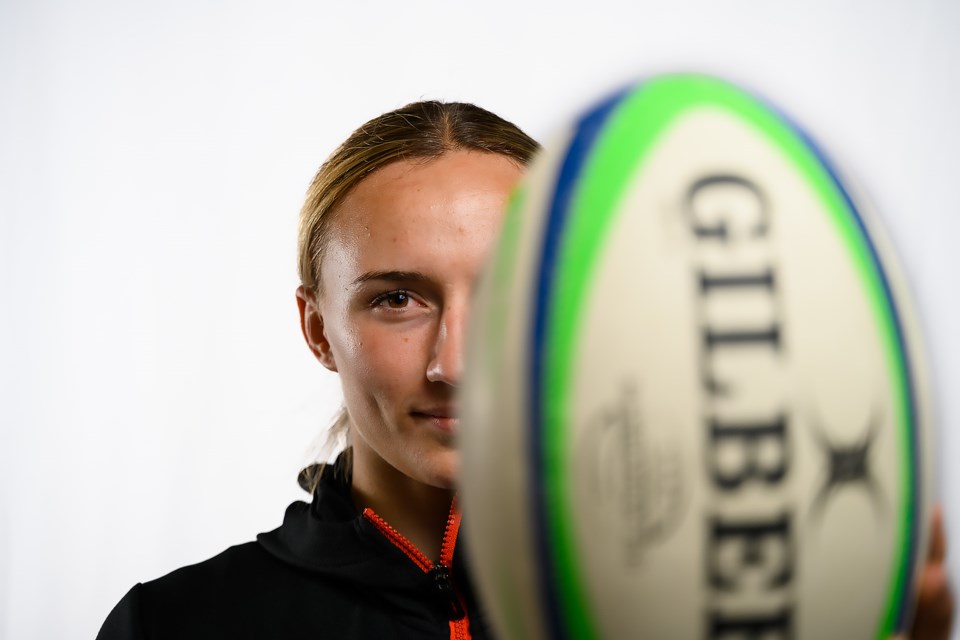No one can turn on the jets quite like Krissy Scurfield.
In the realm of rugby sevens where big hits, quick plays and fast scoring rule over all, Team Canada’s lightning-quick winger is going 100 km/h.
The Canmore-raised athlete is the stereotypical player every team wants to have - a poster girl for excellence: she runs like a cheetah, strives to improve each day, and has a no ego team-first attitude.
When lining up against the other side, the ripped athlete is a menace who causes all sorts of nasty headaches: she hits like a truck, fights her way into the thick of things with ferocity, and has an unrelenting will to chase down any player who dares make a break for a try.
When the rugby ball is in her hands, if feels like a big play is about to happen that other teams won’t be able to stop.
It's been a journey for the bullet in boots who gets her first taste of Olympic action this month in Paris. Scurfield said Team Canada has a focus on being a top-three nation.
When it comes to Scurfield, it's easy to forget that despite being an international standout, she just turned 21 in June and is improving every single day.
“I picked it up later so I really have that fire and love for it,” said Scurfield. “I had that extra push when I debuted [internationally in 2021]. It was huge for me … so I think it promoted that spark.”
Canadians have historically given a saluting nod to athletes who are willing to keep going despite fighting through pain and injuries. During the tournament when the women’s sevens team qualified for Paris 2024, Scurfield publicly displayed such toughness.
Earlier that day, her nose was broken during a match. When the time came for the Olympic-clinching game, she had to make a choice: fix her damaged, bloodied face and get sidelined or bandage up her wounds and play on. She said the decision was easy to make, and she went on to score two tries in that match.
When speaking about Scurfield’s skill, mental toughness and evolution in the sport, Jack Hanratty, the women’s sevens coach, told the Outlook earlier this year that he believes his star-in-the-making pupil has the talent and ability to become the best player in the world.
A review of statistics shows it’s not difficult to see why many are singing Scurfield’s praises.
In the 2023-24 season, Scurfield scored a team-leading 20 tries, something she and teammate Charity Williams co-shared. The two Canadians tied for the 11th most tries in the HSBC SVNS Series.
Looking at the next generation of international star power, Scurfield and New Zealand’s Jorja Miller (30 tries) were the youngest players in the league to have at least 20 tries – both 20 years old at season’s end.
The league has taken notice of Scurfield, too. She's often featured on HSBC SVNS social media highlights, scoring brilliant tries or making amazing defensive tackles.
Being an Olympian has been a long time in the making for Scurfield; however, the natural athlete’s path in rugby started when she was 15 at Banff Community High School, where her impressive play got her commonly mistaken as an older, soon-to-be graduate.
By age 18, Scurfield relocated to Victoria, B.C. for university, but, in many ways, she was handpicked to learn under the Maple Leafs Academy, Rugby Canada's NextGen program for exceptional upcoming female players aspiring to compete in sevens at the Olympics, that is in the same city.
“My journey has not been linear, that’s for sure,” said Scurfield. “I kind of went into Victoria with a goal in mind that I wanted to get on that national team and I would do whatever it takes to get on there but I didn't know my exact path.”
Learning pains and all, Scurfield quickly was placed in a role on the national team. Though, she knew what she had to do to maintain her spot through tireless hard work. When it was hard to make herself go to the gym, she would be there with teammates, who all had a common goal – a gold standard – to be one of the best team’s in the world.
This season, Canada finished fifth in the standings, with its biggest accomplishment being a bronze medal at the Vancouver tournament – their first seven series medal since 2020.
“I know that every single one of us has put in so much work this season so it’s great to look at one of my best friends in the eyes and just feel so proud of them … there was definitely some tears shed at the end of that tournament,” said Scurfield.
“We’re like a family at this point, we’re together more than we are anywhere else and we have so many strong friendships and relationships. It’s a like a team I’ve never been on before and it’s just amazing to be a part of and have some many people i feel i can fall back on if i need to be picked up.”
Women’s Rugby Sevens schedule, available to view on CBC Gem, all times MST
Sunday (July 28)
Canada vs. Fiji at 9:30 a.m.
Canada vs. New Zealand at 1:30 p.m.
Monday (July 29)
Canada vs. China at 8 a.m.
Quarterfinals start at 1 p.m.
Tuesday (July 30)
Semifinals start at 7:30 a.m.
Bronze medal match at 11 a.m.
Gold medal match at 11:45 a.m.
What am I watching?
Rugby sevens 101
Rugby sevens is a faster, shorter, and more intense version of the game with seven athletes per team playing in seven-minute halves. The goal is to outscore opponents, with a try worth five points, and a subsequent conversion being worth two points. Penalties and drop goals are each worth three points.




.png;w=120;h=108;mode=crop)